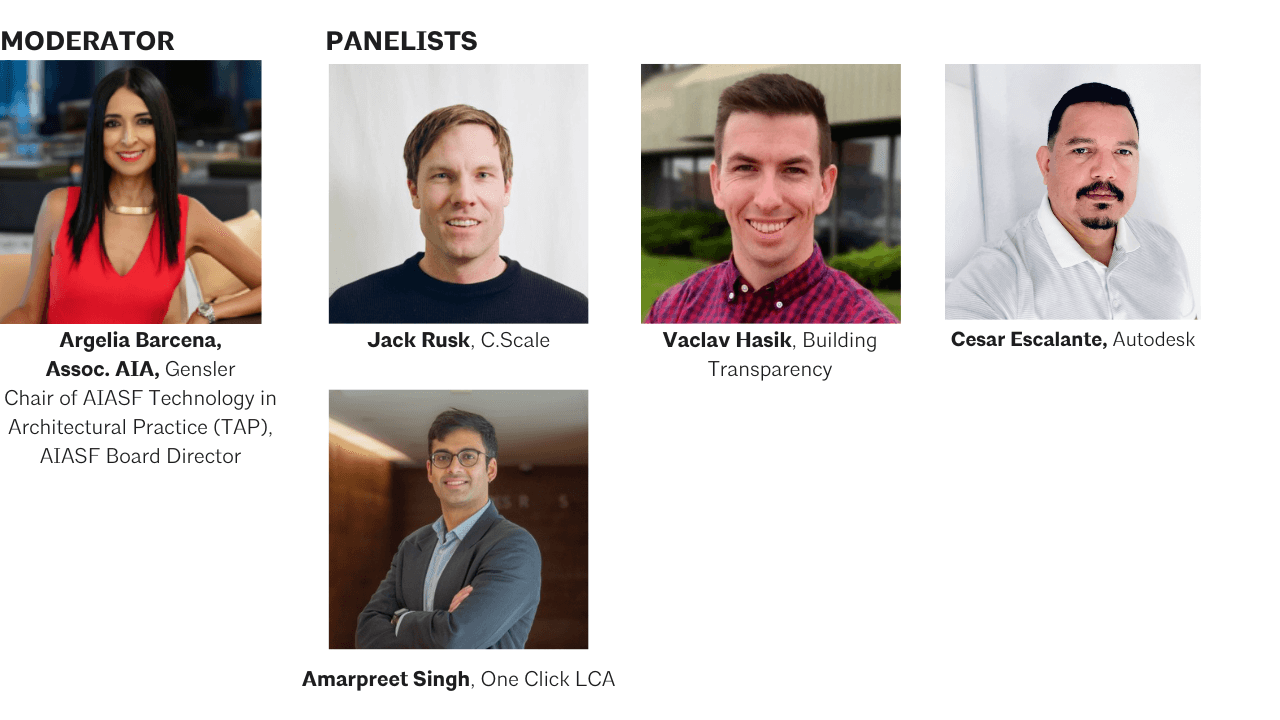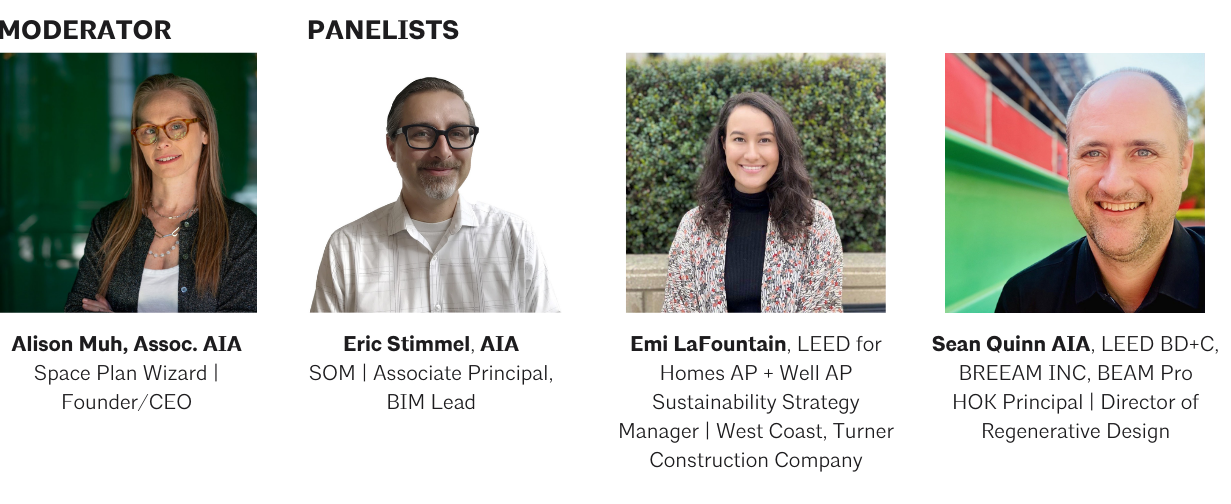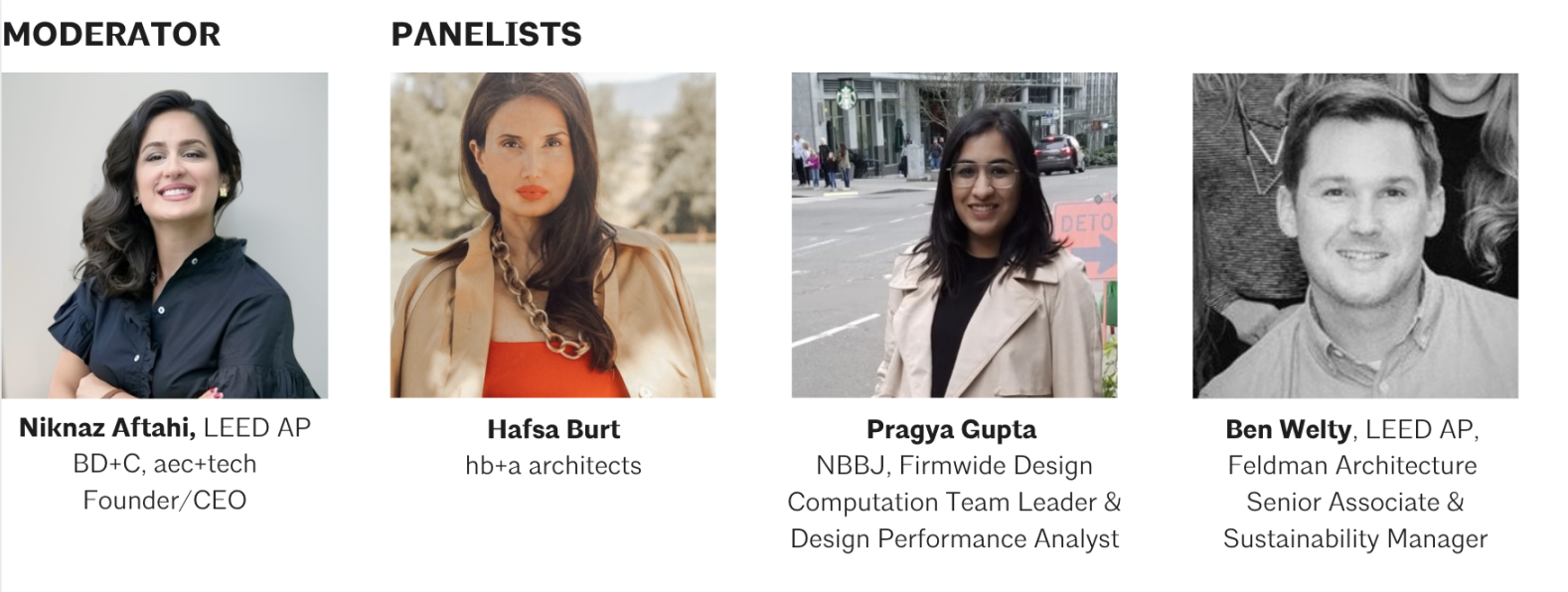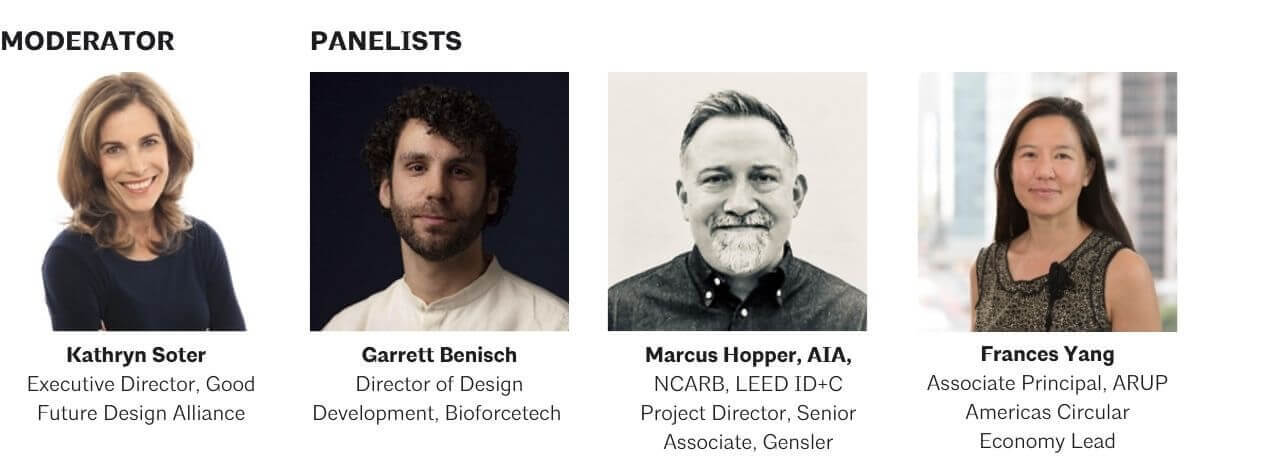ClimateTech '25: Technologies for Action

General: $130 | AIA Member: $95 | Student: $15
The built environment plays a significant role in climate change and resource depletion, making the transition to sustainable design practices in the Architecture / Engineering / Construction (AEC) industries urgent. This symposium brings AEC sustainability experts, technology providers, and others to discuss the innovative tools, practices, and trends supporting this critical transition. Panel topics will focus on the tools and strategies to achieve low carbon design goals, support sustainable building certifications, meet emerging code requirements, adopt new technologies at all firm scales, and introduce circularity into the design process.
Approved for 5 LU/HSW and 4 Hours of ZNCD CA Licensure Credit.
AGENDA
9:30 - 10:00 AM: Check-in & Coffee
10:00 - 10:10 AM: Program Welcome
10:10 - 10:20 AM: Keynote

10:30 - 11:20 AM: Panel Discussion 1 – Carbon Accounting

A focused discussion on the importance of carbon accounting, exploring why it's critical now, the tools available for measuring emissions at various project phases and scales, and the role of high-quality visualizations and outputs appropriate for each stage.
11:30 AM - 12:20 PM: Panel Discussion 2 – Climate & Codes

This discussion explores CALGreen and evolving carbon codes, focusing on their impact on building design, technology adoption, and carbon tracking during construction. It addresses gaps in current practices and emphasizes the need for collaboration between policymakers, design tech companies, and the AEC community to align with regulations, support compliance, and drive sustainable innovation.
12:20 - 1:20 PM: Lunch Break & Technology Showcase
1:20 - 2:10 PM: Panel Discussion 3 – Climate Tech in the Office

A discussion on how firms of all sizes can adopt and advocate for ClimateTech, addressing team motivation, stakeholder engagement, and project integration. Topics include the importance of low carbon design, the circular economy, human health, equity, and the business case for climate-focused design, with actionable strategies for overcoming barriers and building industry-wide alignment.
2:20 - 3:10 PM: Panel Discussion 4 – Material Circularity & Climate

How can architects and engineers design to prioritize reuse, recycling, and repurposing building materials? Join this diverse panel of experts to discover the design tools and technologies needed to create a more circular, reduced-carbon, flexible, and less climate-impactful built environment–delivering material savings in the short term and enhancing building value in the long term.
3:15 - 3:35 PM: Closing Remarks

3:35 - 6:00 PM: Networking Happy Hour and Technology Showcase
Technology Showcase
Visit the ClimateTech Showcase for inspiration and tools that support low carbon, circular, high-value design! Check out live demos of a variety of carbon accounting and reduction tools for architects and engineers. And see informative displays of projects and products that support the low-carbon revolution!
Carbon Software Demos
C.Scale: An early design phase embodied-carbon tool for all project types
CARE Tool: An embodied carbon tool focusing on existing building reuse
Autodesk: Showcasing two of their tools; Forma, an embodied carbon tool integrated with Revit, and Insight an operational carbon tool
US CAD: Showcasing a variety of sustainability CAD standards and workflow tools
Building Transparency: Showcasing two of their tools, EC3, an embodied carbon in construction tool, and Tally LCA, a whole-building embodied carbon life cycle assessment (LCA) tool.
Sustainable Investment Group (SIG): provides sustainability consulting, LEED certification, and ESG solutions to support environmental goals.
IESVE Software: Certified by the California Energy Commission for Title 24 Code Compliance, IESVE is a whole-building carbon simulation software for AIA 2030 Commitment Reporting.
Educational Displays
The Phoenix (Autodesk + MBH Architects + FactoryOS): A Low-carbon affordable housing case study in Oakland CA.
A Carbon Life Cycle Analysis of Bio-materials: (Arup + Stop Waste): A circular vs. linear materials-use case study.
Reclaimed Wood Furniture Project: Paul Mayencourt & Joseph Swerdlin, UC Berkeley College of Environmental Design
Learning Objectives (5 AIA LU/HSW and 4 Hours ZNCD Licensure Credit)
- Analyze the role of carbon accounting in design by identifying the principles of life cycle assessment (LCA) and its integration into architectural workflows to measure and mitigate embodied carbon.
- Interpret emerging carbon code measures and their impact on design practices.
- Integrate climate-friendly technology into architectural practice to enhance workflows and sustainable design.
- Understand material circularity as part of the design process by prioritizing reuse, sourcing and deconstruction.
- Evaluate effective multidisciplinary collaboration for sustainability by examining how architects, engineers, and design technology subject matter experts work together to implement carbon reduction workflows.
Program Sponsors
Silver

Bronze
Copper
Sponsorship Opportunities
Join leading AEC professionals for a day-long exploration of digital tools driving net-zero design, carbon reduction, and sustainable building innovation.
$1,500-$10,000
Volunteer Opportunities
Get involved in the Bay Area Design Community! Fill out our volunteer form today!


